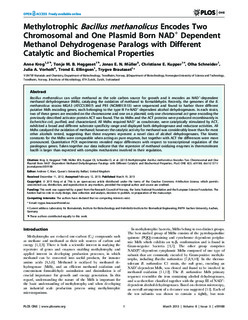| dc.contributor.author | Krog, Anne | |
| dc.contributor.author | Heggeset, Tonje Marita Bjerkan | |
| dc.contributor.author | Müller, Jonas E.N. | |
| dc.contributor.author | Kupper, Christiane E. | |
| dc.contributor.author | Schneider, Olha | |
| dc.contributor.author | Vorholt, Julia A. | |
| dc.contributor.author | Ellingsen, Trond Erling | |
| dc.contributor.author | Brautaset, Trygve | |
| dc.date.accessioned | 2015-11-20T10:55:06Z | |
| dc.date.accessioned | 2016-06-16T09:11:52Z | |
| dc.date.available | 2015-11-20T10:55:06Z | |
| dc.date.available | 2016-06-16T09:11:52Z | |
| dc.date.issued | 2013-03-19 | |
| dc.identifier.citation | PLoS ONE 2013, 8(3) | nb_NO |
| dc.identifier.issn | 1932-6203 | |
| dc.identifier.uri | http://hdl.handle.net/11250/2392812 | |
| dc.description.abstract | Bacillus methanolicus can utilize methanol as the sole carbon source for growth and it encodes an NAD+-dependent methanol dehydrogenase (Mdh), catalyzing the oxidation of methanol to formaldehyde. Recently, the genomes of the B. methanolicus strains MGA3 (ATCC53907) and PB1 (NCIMB13113) were sequenced and found to harbor three different putative Mdh encoding genes, each belonging to the type III Fe-NAD+-dependent alcohol dehydrogenases. In each strain, two of these genes are encoded on the chromosome and one on a plasmid; only one chromosomal act gene encoding the previously described activator protein ACT was found. The six Mdhs and the ACT proteins were produced recombinantly in Escherichia coli, purified, and characterized. All Mdhs required NAD+ as cosubstrate, were catalytically stimulated by ACT, exhibited a broad and different substrate specificity range and displayed both dehydrogenase and reductase activities. All Mdhs catalyzed the oxidation of methanol; however the catalytic activity for methanol was considerably lower than for most other alcohols tested, suggesting that these enzymes represent a novel class of alcohol dehydrogenases. The kinetic constants for the Mdhs were comparable when acting as pure enzymes, but together with ACT the differences were more pronounced. Quantitative PCR experiments revealed major differences with respect to transcriptional regulation of the paralogous genes. Taken together our data indicate that the repertoire of methanol oxidizing enzymes in thermotolerant bacilli is larger than expected with complex mechanisms involved in their regulation. | nb_NO |
| dc.language.iso | eng | nb_NO |
| dc.publisher | Public Library of Science | nb_NO |
| dc.rights | Navngivelse 3.0 Norge | * |
| dc.rights.uri | http://creativecommons.org/licenses/by/3.0/no/ | * |
| dc.title | Methylotrophic Bacillus methanolicus encodes two chromosomal and one plasmid born NAD+ dependent methanol dehydrogenase paralogs with different catalytic and biochemical properties | nb_NO |
| dc.type | Journal article | nb_NO |
| dc.type | Peer reviewed | nb_NO |
| dc.date.updated | 2015-11-20T10:55:06Z | |
| dc.source.volume | 8 | nb_NO |
| dc.source.journal | PLoS ONE | nb_NO |
| dc.source.issue | 3 | nb_NO |
| dc.identifier.doi | 10.1371/journal.pone.0059188 | |
| dc.identifier.cristin | 1020618 | |
| dc.description.localcode | © 2013 Krog et al. This is an open-access article distributed under the terms of the Creative Commons Attribution License, which permits unrestricted use, distribution, and reproduction in any medium, provided the original author and source are credited. | nb_NO |

